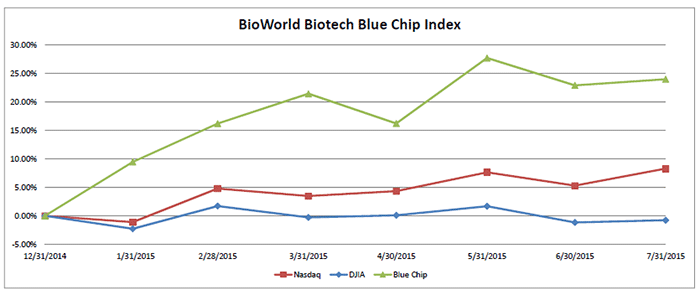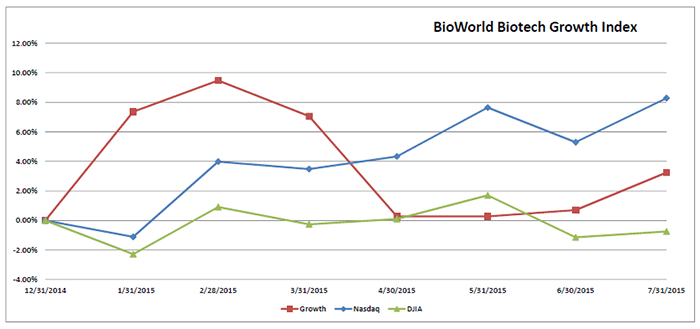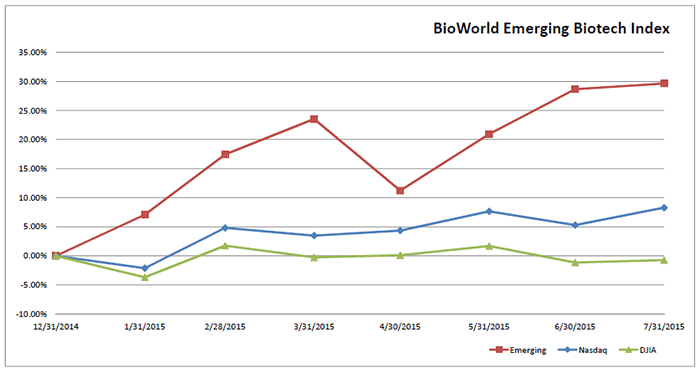
Report cards look positive, but some underachievers still spook investors
Print
17 August 2015
Peter Winter / BioWorld
Second quarter financial results for biotechnology companies are coming in thick and fast and overall, for the larger biotech companies at least, their report cards have been positive. However, a few companies failed to live up to expectations. As a result, the BioWorld Blue Chip Index, comprising 20 of the leading companies ranked by market cap, closed July with only a marginal 0.9 percent gain as the gainers just held sway over the decliners. The slight uptick in value kept the index up at 24 percent year to date, well ahead of the general markets with the Nasdaq Composite index posting an 8 percent increase year to date (3 percent gain for the month), while the Dow Jones Industrial Average continues to have a tough year in the wake of a variety of negative macroeconomic factors and remains down 0.8 percent so far this year. (See BioWorld Blue Chip Index, below.)

The biggest disappointment among biotech's blue chip companies during July was Biogen Inc., which posted second quarter earnings showing little improvement over the firm's weak first quarter returns. Although, on the earnings conference call, CEO George Scangos noted that Biogen achieved 7 percent revenue growth and 21 percent non-GAAP earnings per share growth, "good numbers, but certainly lower than we had anticipated a few months ago."
REACCELERATION EXPECTED
Scangos said the company had expected to see a reacceleration of the sales of multiple sclerosis (MS) drug Tecfidera (dimethyl fumarate) in the second quarter, but it did not happen to any appreciable extent. "Rather, Tecfidera experienced modest sequential patient growth, as we continued to work through the same commercial challenges experienced in the first quarter of the year."
Although the company reported that Tecfidera is the most-prescribed oral MS therapy globally, and has now been used to treat more than 155,000 patients, investors were hoping for more and the company's share value fell a whopping 22 percent, in heavy trading.
Tecfidera revenues in the second quarter were $883 million compared to $700 million in the same period last year, including $721 million in U.S. sales and $163 million in ex-U.S. sales compared to $585 million and $115 million, respectively, in the second quarter of 2014. But revenue growth for the drug was just 7 percent over $825 million reported in the first quarter. Tecfidera revenues increased 11 percent in the U.S., but that growth was partially offset by an 8 percent slide elsewhere, which the company attributed primarily to lower pricing in Germany, since unit volume increased 14 percent.
Total product sales in Biogen's MS franchise barely eked out year-over-year growth: $2.1 billion compared to $2 billion in the same quarter last year. (See BioWorld Today, July 27, 2015.)
$100B MARKET CAP CLUB
It is hard to believe that back in March, Cambridge, Mass.-based Biogen was poised to join the exclusive $100 billion market cap club – but thanks to investors' angst about its prospects for the rest of the year, its shares (NASDAQ:BIIB) closed July 31 at $318.78 (down 21 percent for the month and 6 percent year to date) representing a humbling market cap of approximately $75 billion.
The club did, however, enroll its third member – Summit, N.J.-based Celgene Corp. The company's share price (NASDAQ:CELG) jumped 13 percent in July thanks to a wave of news to keep investors engaged – leading to a market cap of $104 billion.
Helping moving the stock was an excellent second quarter, in which the company reported net product sales of $2.254 billion, a 22 percent increase over the same period in 2014. Adjusted net income increased 36 percent to $1.019 billion compared to $748 million in the second quarter of 2014.
The company has certainly adopted an aggressive business development program with a blockbuster $7.2 billion offer for Receptos Inc., designed to add the highly touted late-stage S1P modulator ozanimod to its immunology and inflammatory franchise and raise the big biotech's 2020 guidance to $21 billion-plus. (SeeBioWorld Today, July 16, 2015.)
The transaction is in keeping with a focus on building its long-term future. The company remains well capitalized and, in the second quarter, it said it purchased approximately 7.9 million of its shares at a total cost of approximately $902 million. As of June 30, the company had approximately $7.5 billion in cash, cash equivalents and marketable securities.
The other members of the $100 billion market cap club didn't disappoint either with their earnings.
Amgen Inc. reported a higher-than-expected second quarter profit, driven in part by strong sales of Enbrel (etanercept), Prolia (denosumab) and Xgeva (denosumab) and cost-cutting.
Net income grew to about $1.65 billion, or $2.15 per share, from $1.55 billion, or $2.01, a year ago. The company had an adjusted profit of $2.57 per share, beating the average analyst estimate of $2.43, according to Thomson Reuters I/B/E/S. Amgen shares closed the month up 15 percent, growing its market cap to $130 billion.
The largest biotech company by market cap ($175 billion), Gilead Sciences Inc. literally "blew away" the Street with its second quarter results. The numbers beat both top- and bottom-line consensus estimates. The Foster City, Calif.-based firm's total revenues were $8.2 billion (consensus was $7.6 billion), compared to $6.5 billion generated in the same period of 2014.
Net income was $4.5 billion, or $2.92 per diluted share in 2015, compared to $3.7 billion, or $2.20 per diluted share in 2014. Non-GAAP net income, which excludes amounts related to acquisition, restructuring, stock-based compensation and other items, was $4.8 billion, or $3.15 per diluted share in 2015 (consensus of $2.70), compared to $3.9 billion, or $2.36 per diluted share in 2014.
Total product sales for the second quarter of 2015 were $8.1 billion compared to $6.4 billion for the second quarter of last year. Leading the way was the company's antiviral franchise, with products generating $7.6 billion for the second quarter, up from $6 billion last year primarily due to sales of hepatitis C virus drug Harvoni (ledipasvir 90 mg/sofosbuvir 400 mg), which was approved in the U.S. and Europe in the fourth quarter of 2014.
Gilead's shares (NASDAQ:GILD) closed July up 0.7 percent.
Regeneron Pharmaceuticals Inc., which saw its shares (NASDAQ:REGN) jump almost 9 percent in July, further improved its share value last week by more than 5 percent by market close Thursday, reporting surging global sales of its blockbuster Eylea (aflibercept) driving company revenues 50 percent higher during the second quarter, leading it to raise full-year guidance for Eylea's growth. The Tarrytown, N.Y.-based company reported net income of $194.6 million during the second quarter vs. $96.4 million during the second quarter of 2014.
In addition to Biogen, shares of Los Angeles-based Puma Biotechnology Inc. (NASDAQ:PBYI) dragged on the Blue Chip Biotech index.
The company's shares continued to slide in July after swooning 27 percent during the American Society of Oncology meeting in June, with investors being less than impressed with the presentation of results from its phase III trial of investigational drug PB272 (neratinib) for the extended adjuvant treatment of breast cancer (ExteNET trial). The study examined neratinib vs. placebo after adjuvant treatment with Herceptin (trastuzumab, Roche AG) in women with early stage HER2-positive breast cancer. The company's shares dropped 22 percent in the month.
BY THE NUMBERS
The BioWorld Biotech Growth Index gained 2.5 percent and the BioWorld Biotech Emerging Growth Index eked out a small 0.8 percent uptick during July. (See BioWorld Biotech Growth Index and BioWorld Biotech Emerging Growth Index, below.)


The performances of those indices reflected the same trend as the Blue Chip Biotech index with gainers just holding sway over the decliners during July.
The performance of those indices are reflective of the performance of the biotech public sector in general which, for the 332 public biotech companies currently tracked by BioWorld, has grown by a collective average of 27 percent year to date.
That tremendous growth in value of biotech companies of all sizes and stages in their evolution has translated into an enormous surge in financings, particularly follow-on offerings. According to BioWorld Snapshots, 161 follow-on deals have been completed so far this year, which is way ahead of the number completed in any year previously. In terms of dollars raised, that translates to $16.4 billion through the end of July, a figure that is closing in on the $16.7 billion raised for the whole of last year.
The surge in follow-on financings is reflective of the incredible amount of cash that has flowed into biotech companies' coffers this year. Public and private company financing has mushroomed to $40 billion year to date, compared with $21.1 billion raised during the same period last year.
The number of IPOs hasn't dropped off either after the record numbers that were completed last year. So far, we have seen 48 completed, generating a collective $4.7 billion.
The industry has set itself up for a strong period of growth for the rest of the year. Expect to see big biotechs pull the trigger on the acquisition of major assets before year end.
All Portfolio
MEDIA CENTER
-
The RMI group has completed sertain projects
The RMI Group has exited from the capital of portfolio companies:
Marinus Pharmaceuticals, Inc.,
Syndax Pharmaceuticals, Inc.,
Atea Pharmaceuticals, Inc.

